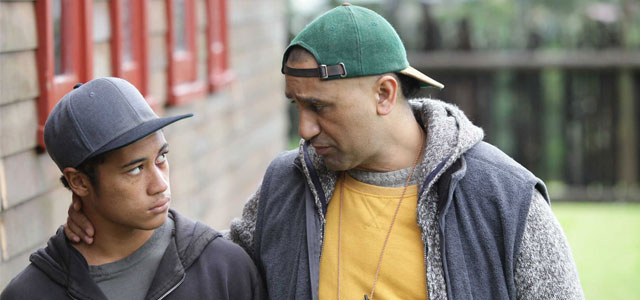(M) Cliff Curtis, James Rolleston, Wayne Hapi, Kirk Torrance
Even if you put the Hobbit films to one side, the New Zealand film industry has really punched above its weight in 2014. Taika Waititi and Jermaine Clement’s vampire mockumentary What We Do in the Shadows has proved to be one of the year’s best comedies, and now we get James Napier Robertson’s affecting and uplifting biopic of the late Genesis Potini, The Dark Horse.
Genesis Potini was once a chess prodigy, but has spent the majority of his adult life in of psychiatric institutions as a result of his bipolar disorder. It is decided that Gen can check out of the facility provided he remains under the care of his brother, Ariki. He is told to avoid stressful situations, something easier said than done given Ariki is the leader of a gang, the Vagrants, and his house serves as their headquarters. Gen moves in with his brother and starts to bond with his nephew, Mana. One day Gen’s eye is caught be a flyer for a local chess club, the Eastern Knights. When it turns out the club is for kids, specifically kids with absent parents in need of some stability in their lives, Gen is not deterred. He decides this club could be a positive thing for him to put his energy into so ambitiously announces at his first meeting that he will lead these kids to the National Junior Chess Championships in Auckland in just six weeks.
On the surface, The Dark Horse sounds like it could be an incredibly formulaic and familiar story. It has the potential to be both a ‘brilliant individual defying the limitations of his mental illness’ story and a ‘disadvantaged kids pulling themselves out of adversity through sport/dancing/chess’ story. Both have been done plenty of times before. But Robertson’s film manages to be neither of them. The Dark Horse is no fairy tale, for Genesis or the kids. There are some harsh realities on display in this at times quite dark story. Gen’s struggles with his bipolar disorder are real, they do not conveniently disappear when he finds a sense of purpose. Likewise for the kids, when they leave the Chess Championships in Auckland, they still go home to the same family situations. Robertson succeeds in showing his audience the incredible significance of this group without sugar-coating or hyperbolising its effect.
The film is able to cleverly connect chess, its rules and strategies with elements of Maori mythology and spirituality. The result is that The Dark Horse becomes an unmistakably New Zealand story. Since his childhood Gen has always known chess as “the warrior game.” In teaching the Eastern Knights the principles of the game he draws on Maori creation stories. For the at-risk youths of the Eastern Knights, Gen’s chess lessons serve not only as instruction in the game but as important lessons in cultural identity as well as more general life lessons about living in community.
The Dark Horse is built around a powerfully emotive performance from veteran Kiwi actor Cliff Curtis. Best known for roles in Once Were Warriors, Whale Rider and bit pieces in Hollywood films taking advantage of his multipurpose ethnicity, Curtis gives a career best performance here. Through the rhythms of his speech, the shuffling awkwardness of his movement and the glazed over eyes that denote a lifetime of heavy medication, he gives authenticity to his character. He swings between moments of heartbreaking fragility and aggressively earnest energy in displaying Gen’s condition as something with which he constantly wrestles.
Mana is played by James Rolleston, who may be familiar to some having played the title character in the comedy Boy in 2010. Rolleston is growing up and shows some real dramatic subtlety here. But the most striking supporting performance comes from first time actor Wayne Hapi as Mana’s father Ariki. Hapi is a physically imposing presence with his large frame, dreadlocks, tattoos and weathered features, but behind his stony face he reveals genuine emotion. Ariki is a father doing what he thinks is best to get his son through a hard life, a life that has done him no favours and gives him no reason to assume it will be different for Mana. He wants to get his son inducted into the Vagrants, a process which involves some horrific hazing initiations, because it is the only way he knows to ensure the boy’s security after he is gone.
Robertson’s script is tight and well balanced, with the exception of a subplot about a troubled teenager, Michael, who has a gift for chess and is ordered by the juvenile court to join the Eastern Knights which appears set to be a major narrative thread only to take a back seat for most of the film before returning to prominence at the end. That said, The Dark Horse is a deeply affecting film with strong performances and a New Zealand setting and cultural context that gives it a unique point of difference.
Duncan McLean













